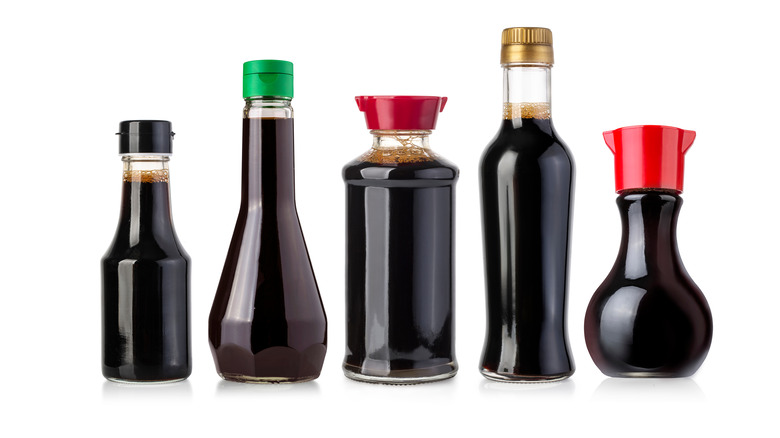Rachael Ray Explains The Difference Between Light And Dark Soy Sauce
We may receive a commission on purchases made from links.
When it comes to soy sauce, you might assume that every bottle is essentially the same. If you don't know much about the kitchen staple and go to a supermarket with a decent selection, it may even be intimidating to select which bottle you should buy. There are two key differences between light and dark soy sauce, which should help narrow it down a bit.
Cookbook author and television personality Rachael Ray broke down the differences between the two in a June 10 Instagram video, explaining that light soy sauce tends to be the saltier of the two, whereas dark soy sauce is typically a bit sweeter. YouTube food personality and cookbook author The Korean Vegan even commented on the post, telling Ray, "I had to spend a good chunk of my book talking about how 'light soy sauce' is actually saltier! So counterintuitive!"
Additionally, Ray adds that there's a subtle difference in viscosity as well, a key consideration depending on how you're planning to use the ingredient. While dark soy sauce is slightly thicker, light soy sauce is a bit thinner. This is partly due to the length of fermentation each type undergoes, as per MasterClass.
Now that you know the main differences between the two, the question to ask before grabbing your bottle of choice is: Which qualities would best serve your dish?
Which soy sauce to use in your recipe
Your choice of soy sauce in a dish depends on the effect you're looking to achieve. However, there are a few helpful rules of thumb for which dishes are accentuated best with light versus dark soy sauce.
As Asian Food Network explains, light soy sauce is commonly used in stir fry and fried rice dishes, or even as a dipping sauce or condiment to sprinkle atop your dish to finish it off. It can also be a great pick in dishes that are a bit lighter where you don't want the color of the soy sauce to alter the color of your final dish, as Serious Eats states. The increased salinity of light soy sauce means it'll add a punch of flavor without adding color.
Dark soy sauce is frequently used in marinades or recipes for stews and soups, as it adds both flavor and color to the dish. If you're making a recipe and it doesn't specify exactly which type of soy sauce is called for, Serious Eats explains that dark soy sauce is typically considered the default. However, you may want to check whether the cookbook or food blog you're using has outlined a default option. For example, The Woks of Life mentions that when they refer to soy sauce in their recipes, they're talking about Chinese light soy sauce specifically.
A few tips from the experts — and the brands they swear by
Though you may be preoccupied with reading the label on the front to determine whether the bottle you're looking at is light or dark soy sauce, there's another thing you shouldn't be missing: the ingredients list. As Epicurious notes, chef Sohui Kim and several other experts all flag that you should look at the ingredients to ensure the soy sauce you're purchasing isn't packed with added sweeteners, flavors, or colors. The addition of any of these may indicate that the soy sauce in question isn't naturally fermented, which gives it a much different (and less appealing) taste.
Packaging is important, too; chef Shota Nakajima suggests looking for soy sauce in a squeeze bottle if possible. While some of the packaging with pour spouts may seem more high-end, he says that the squeeze bottle format helps to prevent oxidation in your soy sauce, which can happen a lot quicker than you might think. While oxidized soy sauce is still safe to eat, the flavor will be slightly altered.
For particular brand recommendations, every chef seems to have their preferences. Chef Niki Nakayama swears by the brand Yamasa for regular soy sauce and Higashimaru's Usukuchi soy sauce for a light option in soups, while Nakajima prefers the Kikkoman brand. Others, such as Katsuya Fukushima, will often combine a variety of soy sauce brands to create their perfect product.


